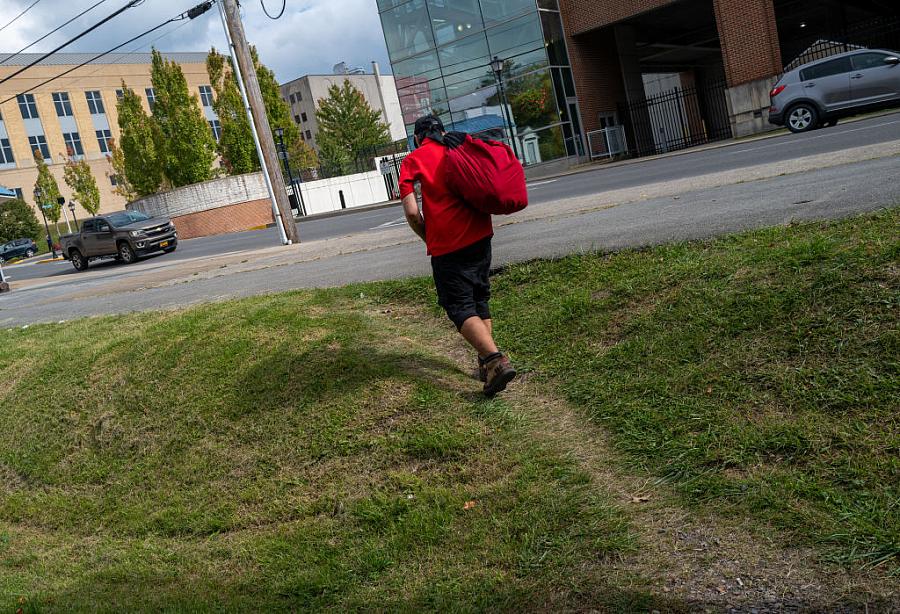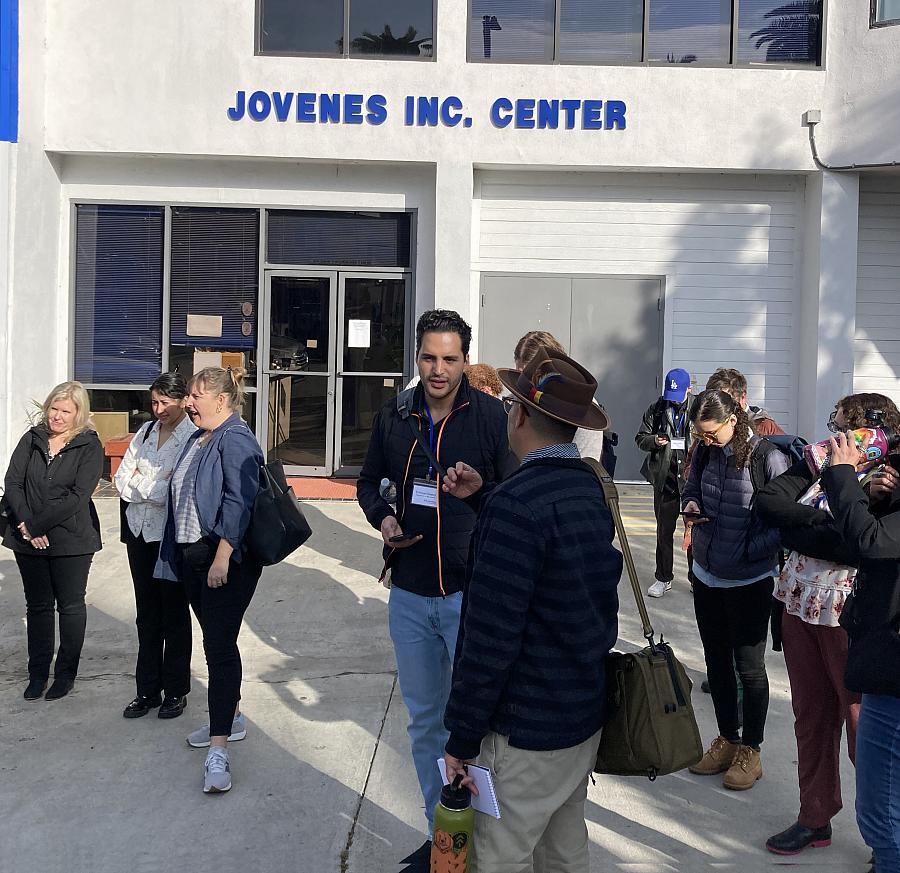For young adults experiencing homelessness in LA, housing is just the beginning

(Photo by Spencer Platt/Getty Images)
The three houses with royal blue and white trim are surrounded by yards sprinkled with sneakers and bikes, looking like any other residence in their Los Angeles’ Boyle Heights neighborhood.
But these are not typical single-family homes or apartments. They’re part of Jovenes Inc., which provides short-term and permanent housing and services for youth ages 18 to 25 to help them break the cycle of homelessness.
“We have an opportunity to create pathways for youth to leave homelessness behind, for good,” said Andrea Marchetti, executive director of Jovenes, during a visit from journalists taking part in the 2024 California Health Equity Fellowship earlier this week.
Jovenes, a Spanish word for “youth,” started in 1990 by a Los Angeles priest who sought to provide food and shelter for the unaccompanied young people arriving at his church’s doorstep after fleeing violence in Central America. Over the past 30 years, Jovenes has grown in size and expanded its programs. In addition to providing emergency and permanent housing, nearly half of its clients are served under College Success, a program launched in 2016 that partners with community colleges to ensure students have the housing and supportive services.
Last year, Jovenes served 675 youth, and 92% of them have maintained stable housing. During that time, more than three-quarters of its clients were Black or Hispanic, and 25% were involved with the foster care or probation systems.
In L.A. County in 2023, more than 75,500 people of all ages experienced homelessness, according to L.A. Homeless Services Authority. Nearly 4,000 of those were 18 to 24, called transitional age youth.
The limited availability of affordable housing and the rising cost of rent are the primary causes of California’s homelessness crisis. Youth who have experienced trauma, such as abuse, witnessing violence, racism and discrimination, family homelessness, growing up in poverty or lacking family support or acceptance, are especially vulnerable to falling into homelessness.
“Housing first” is the evidence-based approach followed by Jovenes. The nonprofit coordinates additional services, such as counseling and case management, and connects clients with community resources, including education, job opportunities and health care.
Jovenes’s housing programs include short-term and permanent housing. The emergency shelter has space for 12 clients, and usually operates at capacity. Those taking part in the permanent housing program sign a lease, work on paying an increasing share of affordable rent, and have tenant rights, with ongoing support and case management.

Journalists taking part in the 2024 California Health Equity Fellowship visit Jovenes, Inc. in Boyle Heights on March 12, to better understand the youth homelessness crisis. (Photo by ChrisAnna Mink for CHJ)
“Housing is not just an end goal but is a tool to help youth achieve better health and economic outcomes and move to self-sufficiency,” said Eric Hubbard, director of development and strategic partnerships at Jovenes.
In 2015, Hubbard and his team became aware of just how many students at nearby community colleges were experiencing homelessness. One in five community college students in L.A. are unhoused and more than half are “precariously housed,” which includes scenarios such as sleeping on a friend’s couch or living in a vehicle. Housing insecurity also affects nearly 10% of California State University students and between 5% and 9% of University of California students statewide, according to the 2021 UC Accountability Report.
Jovenes’ College Success Initiative helps secure housing for youth pursuing higher education, and now includes 10 community colleges and universities in LA County.
Dr. Diane Tanaka, medical director of the Homeless Adolescent and Young Adult Wellness Clinic at Children’s Hospital Los Angeles, said the health care needs of unhoused youth aren’t much different from young people who are housed, though they may have increased rates of sexually transmitted infections and skin disorders due to their living conditions. But they do often have a complex history of trauma and adversity.
“A youth who’s growing up in a household with caring, supportive adult, who feels affirmed for who they are…we don’t meet them,” Tanaka told Fellows during the Jovenes visit. “There’s trauma that occurred or adverse childhood experiences (for our patients).”
Tanaka was joined by Dr. Moises Rodriguez, a clinical psychologist who serves as mental health director at the Homeless Adolescent and Young Adult Wellness Clinic, who said the complex trauma he sees in youth experiencing homeless is often ongoing.
“It’s different than PTSD because you can still be in the eye of the storm,” said Rodriguez.
He finds not everyone is ready for traditional therapy, so he prefers to meet youth where they are and tailor his interactions to their needs. Small initial interactions can build trust over time and lead to deeper work with clients. Unconventional approaches can break the ice and reach people in ways that traditional therapy never would.
“There’s a lot of things outside therapy that can be therapeutic,” said Rodriguez.
He has groups that meet to play basketball, work out, hike or play games. For others, he may help connect them with other resources, such as a job lead or a gift card to buy new shoes, which he also thinks can be therapeutic and lead to further resources and treatment.
Rodriguez was joined at Jovenes by one of his clients, L, who asked not to use his name. Now 23, he said has been on his own since he was 13.
“Sometimes people don’t want to open up,” said L. “(It’s about) being able to feel free.”
“When you get to express yourself freely emotionally and spiritually, knowing there’s no judgment and no criticism…it’s just so helpful,” said L.
All of the panelists at Jovenes converged the same advice to journalists covering unhoused youth: be respectful, give the young person some context on why you’re seeking to tell their story, and be careful not to retraumatize someone with insensitive or exploitative lines of questioning.
“Housing is a right,” said Jovenes’ Marchetti. “So, continuing to advocate for affordable housing and permanent, supportive housing is the most important thing we can do.”

